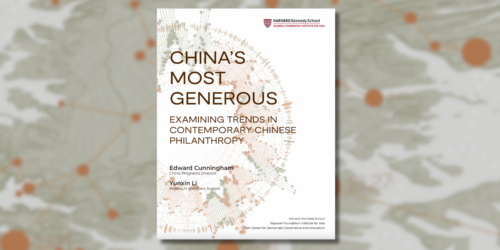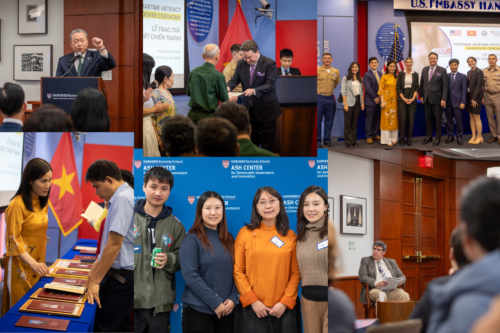
Edward Cunningham
Director of Ash Center China Programs and of the Asia Energy and Sustainability Initiative; Adjunct Lecturer in Public Policy
China’s first systematic and rigorous database of philanthropists, giving levels, and recipients
The rise of private wealth is one of the most important developments in modern China, with implications for the country’s social, economic, and political arenas. How individuals choose to deploy such resources will shape the relationships between the individual and the state, between the state and business, and between the state and the social sector.
We created China’s first systematic and rigorous database of philanthropists, giving levels, recipient organizations, and a host of other research variables related to philanthropists and recipients.
The rapid growth of Chinese philanthropic giving has also led to significant levels of mistrust, misinformation, and misunderstanding that have already seemed to hamper the development of the sector. We believe that an independent, verified, and research-oriented design of a Chinese giving database will enable much-needed quantitative research and will also result in indices that can be used by a range of government, academic, media, and non-profit organizations.
We also focus on precedents and models of philanthropic giving that can inform a new generation of wealth in China. The majority of models and frameworks presented to Chinese philanthropists over the past decade have related to the high profile philanthropists of the West, such as Rockefeller and Ford. In this project we bring together scholars and practitioners from areas of the world that have clear ideological, institutional, social and political similarities to China, but have remained understudied. Russia and Eastern Europe are transitional political economies that share aspects of political and institutional foundations with China, and offer lessons for how philanthropic activities are shaped by – and interact with – the state.
Philanthropic practices of Chinese in Southeast Asia offer instructive insights into geographies with cultural similarities to China. This project also includes a significant focus on China itself – what traditions does China draw upon and what precedents of state/society dynamics in limiting the growth of philanthropy persist to this day in China? This set of research activities will result in a series of symposia, policy briefs, scholarly articles, and seed further fellowship collaboration internationally. We also hope that the indices resulting from the project can be actively tested and used by the international network of scholars and practitioners created by this project.
Director of Ash Center China Programs and of the Asia Energy and Sustainability Initiative; Adjunct Lecturer in Public Policy
Daewoo Professor of International Affairs and the Harvard Kennedy School; Director of the Rajawali Foundation Institute for Asia
Research and Data Analyst, China Public Policy Program
Media Release
The Rajawali Foundation at Harvard Kennedy School released, “China’s Most Generous – Examining Trends in Contemporary Chinese Philanthropy”, which provides insights into current trends among China’s major donors and recipients.
Report
This report on elite philanthropy presents the latest findings from the Harvard Kennedy School Rajawali Foundation Institute’s China Philanthropy Project and provides insight into current trends among China’s major donors and recipients.
Feature
This past semester, the Rajawali Foundation Institute for Asia engaged in conversations and research on topics ranging from Indonesia’s election to US-Taiwan relations with the goal of continuing to develop policy solutions to the region’s most pressing concerns.
Policy Brief
Policy Brief
Policy Brief
Feature
Alumni of China Philanthropy Program tackles issues around bathroom access in China
Values and Vision: Perspectives on Philanthropy in 21st Century China is an exploratory study of philanthropic giving among China’s very wealthy citizens.
Feature
Policy Brief
Book




